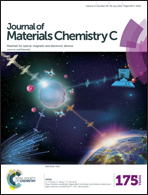High efficiency organosilicon-containing polymer sensors for the detection of trinitrotoluene and dinitrotoluene†
Abstract
Trinitrotoluene (TNT) and dinitrotoluene (DNT) as the most common explosives are considered to be harmful to the environment and humans. Therefore, the detection of these explosives has been attracting more and more attention. And easily prepared polymer materials with high sensing performance are still in demand. In this study, two silicon-containing polymers, PCzSiO and PCzSiPh, are employed to detect the explosives TNT and DNT. PCzSiPh shows a better performance and the quenching efficiency of PCzSiPh films in TNT and DNT vapor can reach 91.0 ± 0.3% and 94.4 ± 0.3%, respectively, due to their loose molecular chain structure. Furthermore, the fluorescence quenching of PCzSiPh in TNT and DNT is little dependent on the thickness of the film. And the PCzSiPh films show good reversibility, good film-forming ability and high thermal and morphological stability, which suggest their potential application in the coating of detection devices.


 Please wait while we load your content...
Please wait while we load your content...